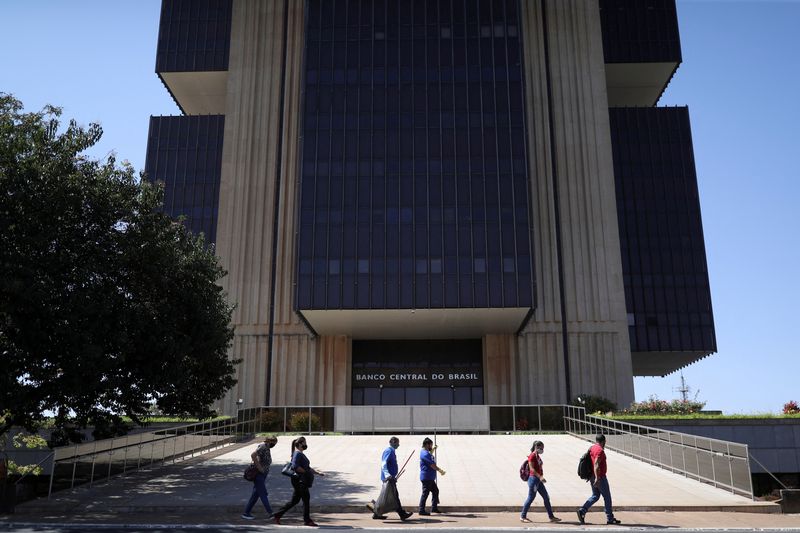Brazil’s risky debtors triple since 2019 – central bank
2022.11.30 14:48
[ad_1]

© Reuters. FILE PHOTO: People walk in front the Central Bank headquarters building in Brasilia, Brazil August 25, 2021. REUTERS/Amanda Perobelli/File Photo
By Marcela Ayres
BRASILIA (Reuters) – Brazil’s central bank said on Wednesday that 12.2% of borrowers from authorized financial institutions are in a “risky indebtedness” situation, with the total number of Brazilians in that category almost tripling since 2019.
The data shows that more consumers are facing difficulties settling debts amid expanding access to the financial system, on the back of a fintech boom and the digital payment welfare aid during the pandemic which increased the number of users.
Mauricio Moura, the central bank’s Director of Relationship, Citizenship and Conduct Supervision said at a conference on over-indebtedness that the number of borrowers in “risky indebtedness” rose to 12.2 million people in June.
In December 2019, they were 4.6 million, or 5.4% of the total, according to a central bank study.
Debtors are considered risky by the central bank if they present at least two of the following situations: default for more than 90 days; monthly disposable income below the poverty line after debt service is paid; simultaneous exposure to more expensive credit lines; and commitment of more than 50% of monthly income to paying debt service.
The data adds to other indicators that highlight growing consumer indebtedness amid higher borrowing costs, after the central bank aggressively raised interest rates to 13.75% from a 2% record-low in March 2021 to battle inflation in Latin America’s largest economy.
Leftist President-elect Luiz Inacio Lula da Silva, who takes office in Jan 1, has promised to launch a broad consumer debt renegotiation program backed by government guarantees to tackle a problem that has begun to show up in some banks’ results.
Non-earmarked loans to consumer and business increased to 4.2% in October, the highest level in almost four years.
The central bank recently warned of its growing concern about the effects of lower economic activity on credit risks in the country, pointing to a significant increase in risks on financing families this year.
According to policymakers, individuals’ ability to pay has deteriorated despite better economic and labor indicators, and the scenario tends to become more challenging as the economy slows down.
Private economists forecast Brazilian GDP to grow by 0.7% in 2023 after a 2.8% expansion this year, according to a weekly survey by the central bank.
[ad_2]
Source link








